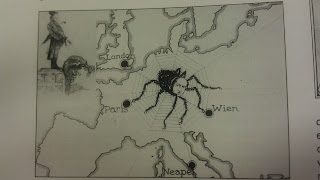"@#$% YOU!!!"
Someone was cursing at me, ruining what should have been a serene day of enjoying mother nature's beauty at my local winter resort. This particular hooligan was dropping F-bombs like a bad boy 4th of July, all because I had "SUPPOSEDLY" cut him off on his way to a jump on the middle of the trail. This situation almost got ugly, but it could have easily been avoided if both of us (mainly him) had obeyed a few basic unwritten rules. Here they are, in no particular order:
Call Your Drop
Snowboarding in Southern California is phenomenal, because even though the snow is limited, there is huge variety of terrain features such as jumps, wall rides, stairs, rails, and boxes, just to name a few. It's like a bouncehouse, only bigger. And colder. If it looks like people are waiting to hit one of these terrain features, you need to "call your drop." This means looking around, making sure no one else is approaching, and then anouncing "DROP," or "DROPPING IN."
It is impolite and dangerous to swoop in without calling your drop. Maybe there's a line, or maybe people just want to watch and see how it's done. Either way, calling your drop lets others know that you're respecting their spot, and it lets them know that you're ready to go. This helps reduce confusion for everyone. If only my foul-mouthed friend would have followed this rule...
Fill Up the Chair
Use all empty seats on a chairlift. If the chair seats four, and two dudes you don't know are lined up to get on the chair with you and your friend, GET ON THE CHAIR. Don't hang back and leave two seats empty just so you and your buddy can have special time. First, you just wasted a chair, and if everyone is as antisocial as you are, the line is going to take FOREVER. That means less riding for everyone, including you.
Second, chances are two more people are going to jump on the next chair with you, so you won't be alone anyway. If you're so antisocial that you can't handle sitting next to a stranger for five minutes, you probably shouldn't be hanging out at a crowded winter resort in the first place.
Steer Clear of the Big Jumps
If you see a mysterious looking hill in the middle of the run, it's probably the landing of a HUGE jump. Stay away. These suckers are so big that hardly anyone attempts them, but once in a while some superman will come hurtling across the sky, and if you're in the way, he will land on your unassuming dome. It will probably be tragic. Serious injury will occur, and even if you walk away, the rider you cut off will be so mad, he/she will make sure you suffer harm for your foolish mistake.
Avoid Claiming
If you
are good enough to take on those big jumps, don't be a Claimer. A Claimer makes sure the whole world knows the moment he/she does something remotely interesting. When you pull off a trick you think is cool, keep those happy thoughts inside, and share them with someone who cares, like your mom and dad. If you're like me, even mom and pops aren't interested.
The sad truth is whatever you did looks way cooler in your mind than it does in real life. There are few things more pathetic than a fist-pumping celebration after catching less than a foot of air off a mogul.
Stomp your trick, and ride away clean like you do it every night in your sleep. Humility is king.
Stay Strapped
This one's more for the newbies. Almost NEVER will you need to remove your board while on the hill. If you're too tired or if you find yourself in a tough spot, ask someone to flag down ski patrol, and they'll radio for someone to give you a courtesy ride to the bottom in one of their nifty toboggans.
What's the big deal, you wonder? Unstrap your board on the hill, and there is high likelihood that sucker will slide away from you. You'll probably never see it again, because it has been transformed into a snowy bullet that can break bones and split skulls. Literally.
Under no circumstances should you EVER attempt to sit on your board and use it as a sled. People die every year at ski resorts across the nation, and this sort of stupidity is part of the reason why.
I'm sure some of you seasoned shredders out there can come up with some rules I've left out, but I find it hard to believe anyone would totally disagree with my five Unwritten Laws:
- Call Your Drop
- Fill Up the Chair
- Avoid the Huge Jumps
- Quit Claiming
- Stay Strapped
Follow these, and we can avoid violence, injury, and looking like fools. That goes for you too, Mr. Foulmouthed claimer catching six inches of air.
Photo Credit:
Teadrinker,
Masochismtango


























